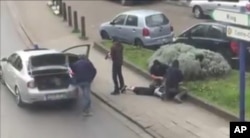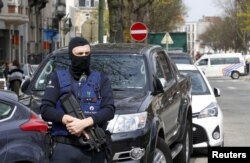Belgian police conducted fresh arrests and searches in connection with both the Brussels and Paris attacks Tuesday, even as reports surfaced of a quirky fallout to their success: worries by local prison guards over how to handle the mounting number of detainees.
Two more men, identified as Smail F. and Ibrahim F., were charged with terrorist activities and murders in connection with last month's Brussels bombings that killed 32 people, Belgian federal prosecutors announced. Local media said the two are brothers.
Brussels police also detained three other people for questioning about the November attacks in Paris, following searches of two residences in the capital's Uccle district, the prosecutor's office said in a separate statement.
Official statements offered few details about the detentions, but local media reported that a judge will decide Wednesday whether the three will remain in custody.
Criticism for Belgium
Belgian authorities have faced sharp criticism over intelligence and security lapses linked to both the Brussels and Paris attacks, including the four months it took to capture top Paris terrorist suspect Salah Abdeslam.
While acknowledging shortcomings, Prime Minister Charles Michel has rebuffed foreign criticism over the country's actions — noting, for example, the years it took the U.S. to hunt down and kill al-Qaida leader Osama bin Laden.
Moreover, Belgian police have made a series of arrests before and after the Brussels attacks, sometimes working alongside their French counterparts. Abdeslam was nabbed near his childhood home in Molenbeek days before the bombings at the Brussels airport and metro station. He is now being detained at a high-security prison in the town of Bruges.
A prison photo released Tuesday by the Flemish-language Het Nieuwsblad newspaper shows Abdeslam sporting a beard and shoulder-length hair.
Police techniques
Police have also arrested Mohamed Abrini, the alleged "man in the hat," who was captured on CCTV footage alongside the two Brussels airport bombers shortly before their suicide attacks.
French criminology professor Alain Bauer believes Belgium's record in fighting terrorism is no worse than many other Western nations.
"They are doing the same things we all do, unfortunately," Bauer said, "which is to have a fetish in technology, and to think that Google will provide the answers."
Still, he praised the "good, old-fashioned" techniques of Belgian police, "who are trying to catch suspects using informants, and which is working pretty well."
Guards concerned
The mounting number of detainees is creating a new set of problems. Roughly a dozen terrorist suspects, including Abrini, are now housed in the Forest prison in Brussels, according to local reports, which is close to the site where they are taken for questioning.
Prison guards are concerned.
"We don't have the necessary infrastructure," a spokesman for the guards’ union, Mohed Bercha, told the Belga news agency. "There are no special cells for them and therefore they're not detained apart [from the general prison population]," he added. "Each time they're moved, it blocks the whole prison."
Two other Belgium prisons are specially equipped to house radicalized detainees, according to Belga. One, the Hasselt prison in eastern Belgium, is still under construction, and unions there are threatening a strike.







